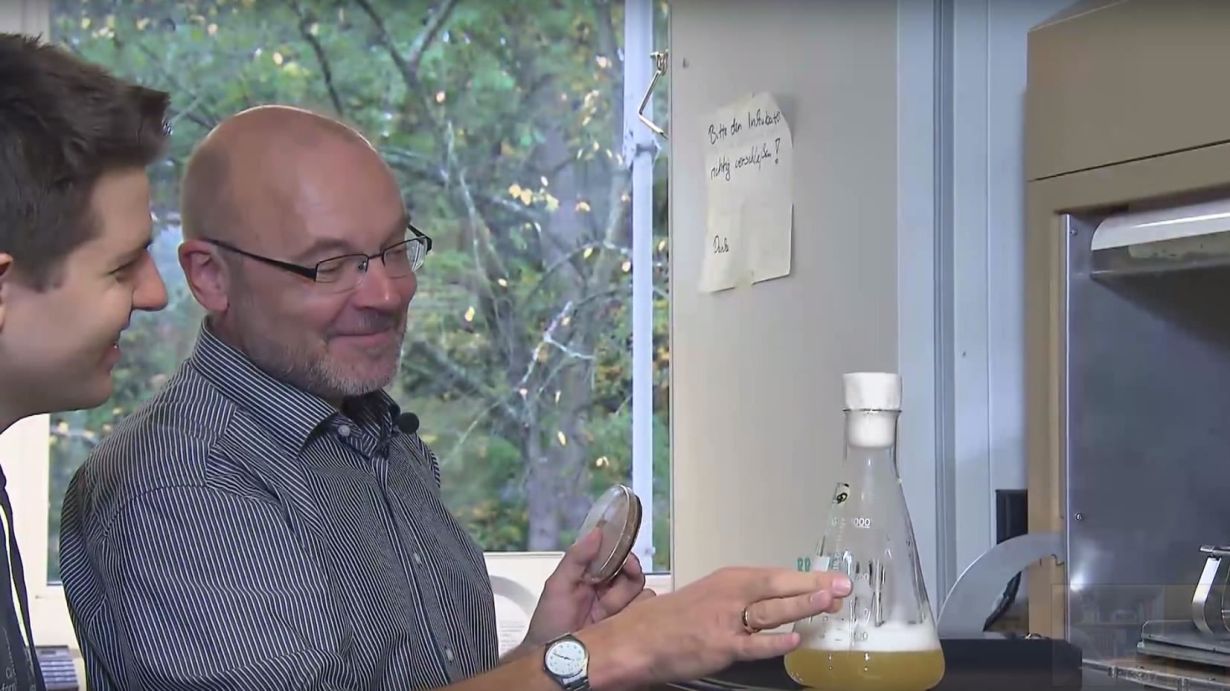Oil is still the most economically attractive resource for fuels and basic chemicals that can be used to manufacture everyday products such as plastic bottles and detergent. New biotechnological processes aim to simplify the use of renewable biomass as an alternative to the fossil raw material and make it more cost-effective. Researchers at KIT are focusing on plant biomass such as wood and straw which is not used as food or feed. These and other innovation stories are presented in KIT’s current NEULAND magazine.
Oil is profitable but its use is detrimental to the climate and environment. Besides, supplies of the fossil raw material are dwindling. Processes applied so far to win basic chemicals such as ethanol from renewable materials are expensive. What is more, they use plants such as maize, sugar beet and rape which also serve as food for humans and animals. “To achieve sustainable and environmentally friendly energy and raw material supply, we need to develop innovative technologies which make the use of renewable biomass also attractive from an economic point of view,” says Professor Christoph Syldatk, Head of the Institute of Process Engineering in Life Sciences II / Technical Biology at KIT. His research group is examining how raw materials that do not compete with food or feed can be processed biotechnologically – for example straw, green waste and sawdust. These second-generation, non-edible, bio-based raw materials consist to a large extent of lignocellulose which forms the cell walls of woody plants. To be able to use lignocellulose, however, it first needs to be broken down into its components (fractions). This process has so far been time-consuming and expensive. To reduce production costs and establish lignocellulose as a raw material, researchers at KIT are examining, among other things, how – on the basis of lignocellulose fractions – new types of biosurfactants can be produced using microbial or enzymatic synthesis.
The aim is to convert the woody biomass into basic components for the production of chemicals and materials such as bioplastics. Bacteria, yeasts and molds are among the microorganisms, the metabolism of which is used by researchers in the lab for such innovative product syntheses and chemical changes. Some industry partners are already implementing KIT’s application-oriented research on a large scale. Products can be manufactured using a bio-based process. Their molecules and properties are identical to those of petrochemical components. “On top of that, there are more options to modify the molecular structure,” explains Syldatk. For example, plastics can be equipped with a higher melting point or greater gas permeability, and surfactants with modified foam properties. “We are trying to play around with bacteria in fundamental research to find out which functions the respective structures have, and if possible to produce tailor-made compounds,” says the biotechnologist.
Process optimization is also involved in the use of microorganisms for further processing of synthesis gases which are produced by pyrolysis from straw or wood waste in the bioliq pilot plant at KIT. “A major advantage of using synthesis gas is that it provides the same starting conditions, no matter what type of biomass was used as a raw material,” says the researcher. Flue gas can now also be converted with the help of microorganisms, “because they tolerate sulfur compounds or even use them for their metabolism. For chemical processing, the combustion gases would first need to be cleaned from these toxic compounds,” explains Syldatk. In its bio-economy research program, the state of Baden-Württemberg supports the KIT-driven development of innovative methods for the microbial use of lignocellulose.
More information on this and KIT’s other innovation topics can be found in NEULAND magazine:
http://kit-neuland.de/de/magazin/potenziale/auf-dem-holzweg-in-die-zukunft
http://kit-neuland.de/de/magazin/das-magazin-neuland
Video interview and lab tour with Christoph Syldatk:
https://www.youtube.com/watch?v=Sh1l7JljJpU
More about Christoph Syldatk’s research:
https://tebi.blt.kit.edu/forschung.php
In the current publication in the “Frontiers in Chemistry” journal, the research group is presenting the first eco-friendly enzymatic synthesis of economically important fatty acid sugar esters on the basis of lignocellulosic biomass:
https://www.frontiersin.org/articles/10.3389/fchem.2018.00421/full
In close partnership with society, KIT develops solutions for urgent challenges – from climate change, energy transition and sustainable use of natural resources to artificial intelligence, sovereignty and an aging population. As The University in the Helmholtz Association, KIT unites scientific excellence from insight to application-driven research under one roof – and is thus in a unique position to drive this transformation. As a University of Excellence, KIT offers its more than 10,000 employees and 22,800 students outstanding opportunities to shape a sustainable and resilient future. KIT – Science for Impact.

